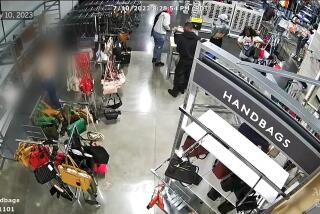Retail Group Urges Disclosure
- Share via
WASHINGTON — A trade group for the nation’s retailers is urging its members to tell customers upfront what types of personal information they’re collecting at the cash register and how they’re using it. Privacy advocates say the voluntary guidelines don’t go far enough.
The National Retail Federation, which represents companies from department stores to discount warehouses, also recommends that customers be given the option of not receiving promotional mailings and tells stores to prevent abuses by their own snooping employees.
“We ask the company to put themselves in the customer’s shoes,” said Mallory Duncan, vice president and general counsel for the group, the largest association of retailers in the U.S. “What you read or the kind of video you rent probably tells . . . more about you than your sock size. The level of confidentiality should be treated accordingly.”
Duncan said the federation has been looking into the privacy issue for two years. In January, it adopted principles that retailers can use to set their own policies. Information on the new principles, the first attempt by the organization to deal formally with the privacy matter, began going out to member stores and associations shortly after the group’s board meeting.
The trade group said it developed the policies because customers are increasingly worried about privacy; because of the possibility Congress would approve privacy rights laws; and because retailers, through frequent-buyer clubs, are collecting increasing amounts of information about their customers.
It announced the rules publicly only after independent counsel Kenneth Starr issued subpoenas for two Washington bookstores last month to learn what Monica Lewinsky had bought--information gleaned in part from her credit card purchases. A judge has put that request on hold, saying Starr must prove a compelling need for the information.
Starr is investigating whether President Clinton had a sexual relationship with Lewinsky--which both have denied in sworn statements--and urged her to lie about it.
Jonathan Brennan and his wife, who live in Redwood City, Calif., wished they had known the privacy they were giving up to shop at a maternity store.
The couple decided to keep the news of their first pregnancy to themselves during the first few months, not even telling family or close friends. But after one of their first purchases at a maternity shop, the mailings started: diaper coupons, ads for baby formula, subscription offers for parenting magazines.
Eventually, the couple discovered the maternity shop had sold their name and address to a marketing company.
What the Brennans found is a fact of life among today’s high-tech, computer-savvy stores: Every time Americans rent a videotape, buy toothpaste at a shopper’s club or simply use a credit card, companies can compile information about the way they live and shop.
Stores can use membership or discount cards scanned during each purchase to develop a profile indicating the frequency of shopping trips, the amount spent and brands purchased. Some companies use the information to mail tailored ads. Others sell the information.
The only laws banning such sales deal with certain credit information, details of telephone calling habits, and cable TV and videotape rental preferences.
“Customers must be given control over the use of their personal information, and that control needs to be enforceable,” said Dave Banisar, an attorney with the Washington-based Electronic Privacy Information Center.
The Brennans eventually complained enough that the maternity store removed their name from its mailing list. But Brennan said that took weeks of haggling, adding, “There’s no way to repair the damage after it’s gone out.”
More to Read
Inside the business of entertainment
The Wide Shot brings you news, analysis and insights on everything from streaming wars to production — and what it all means for the future.
You may occasionally receive promotional content from the Los Angeles Times.










